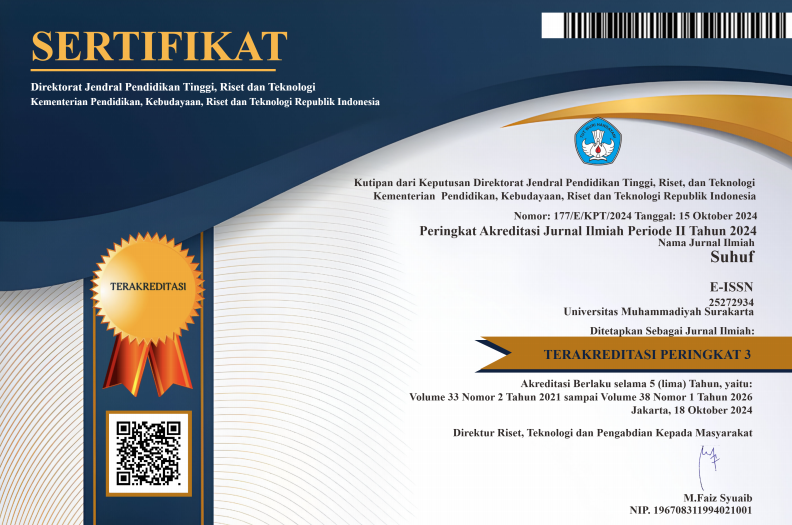A Study of Hadiths About Riya' in the Book of Hidayatus Salikin Perspective of Abdul Samad Al-Falimbani
DOI:
https://doi.org/10.23917/suhuf.v36i1.3431Keywords:
Hadith, Riya', Abdul Samad al-Falimbani, Hidayatus Salikin, BehaviourAbstract
The Qur'an and hadith are the main guides for Muslims, but the temptation of lust sometimes leads humans to riya' behavior, which is doing good only for the praise of humans, not the pleasure of Allah. The book "Hidayatus Salikin" written by Abdul Samad al-Falimbani, is a phenomenal work that is quite calculated among Muslims. The figure with expertise in Sufism and philosophy more or less suggests practical applications in everyday life related to religious issues. Descriptive qualitative research method with content exploration in the book "Hidayatus Salikin". This article will present the concept of riya' from various scholars' perspectives and emphasize the importance of pure intention in worship. By focusing on the Hadiths of the Prophet Muhammad PBUH contained in the book "Hidayatus Salikin", this article provides an in-depth understanding of the dangers of riya' and the need to maintain sincere intentions, according to the teachings of the Qur'an and Hadith. Sheikh Abdul Samad al-Falimbani encourages Muslims to practice religion with purity of intention, avoiding riya', and following the guidance of the Qur'an and hadith. Riya' or performing acts of worship for human praise is considered shirk khafi (hidden shirk). This discourse underscores the necessity for Muslims to cultivate purity of intention, thereby fortifying their spiritual endeavors against the insidious influence of riya'.
Downloads
References
Z. Afna, “Riya Dalam Perspektif Imam Al-Ghazali (Studi Deskriptif Analitis Kitab Ihya’Ulumiddin),” Perpustakaan UIN AR-RANIRY, 2021. [Online]. Available: https://repository.ar-raniry.ac.id/id/eprint/17477/
S. Farwati, “Riya’dalam perspektif al-qur’an: analisis pemikiran M. Quraish Shihab dalam Tafsir Al Misbah,” Perpustakaan UIN Mataram, 2019. [Online]. Available: https://etheses.uinmataram.ac.id/597/
L. S. Rahmasari, “Integrasi Agama Dan Sains (Konsep Kosmologi Menurut Harun Yahya Dan Kritiknya Terhadap Materialisme),” UPT Perpustakaan UIN Ar-raniry, 2021. [Online]. Available: https://repository.ar-raniry.ac.id/id/eprint/16020/
M. Masyrullahushomad and H. Heryati, “Peranan Syaikh Abdus-Samad Al-Palimbani dalam Sejarah Perjuangan Bangsa Indonesia Melawan Penjajah Abad XVIII,” Danadyaksa Hist., vol. 2, no. 1, pp. 35–53, 2022, doi: https://doi.org/10.32502/jdh.v2i1.4826.
M. Muhid, A. Prayogi, F. Miladiyah, A. Nurita, and F. A. Izzuddin, “Karakteristik Syarah Hadis ‘Abd Al-Şamad Al-Fālimbānī: Tinjauan Kitab Hidāyah Al-Sālikīn Dan Siyar Al-Sālikīn,” TAJDID J. Ilmu Ushuluddin, vol. 22, no. 1, pp. 184–223, 2023, doi: https://doi.org/10.30631/tjd.v22i1.330.
M. Sari and A. Asmendri, “Penelitian kepustakaan (library research) dalam penelitian pendidikan IPA,” Nat. Sci., vol. 6, no. 1, pp. 41–53, 2020, doi: https://doi.org/10.15548/nsc.v6i1.1555.
S. Sugiyono, Metode Penelitian Pendidikan Pendekatan Kualitatif, Kuantitatif dan R & D. Bandung: Alfabeta, 2018.
R. Husna, M. Maqfirah, and S. A. Alsounusi, “Interaction Between Religious People in the Qur’an: Examining Tolerance in Tafsir Bun Yanun Marshush,” SUHUF, vol. 35, no. 2, pp. 20–30, 2023, doi: https://doi.org/10.23917/suhuf.v35i2.23120.
A. Pramasto, “Idealisme Sosial Kemasyarakatan dalam Kitab Hidayatus Shalikin karangan Syaikh Abdus Shamad Al-Palimbani,” Anal. J. Stud. Keislam., vol. 20, no. 1, pp. 1–18, 2020, doi: http://dx.doi.org/10.24042/ajsk.v20i1.6806.
N. Rahmi, N. A. Dalimunthe, and N. Fitri, “Kajian Naskah Klasik: Kitab Sira Al-Salikin Karya Syeikh Abdus Shamad Al-Palimbani,” Log. J. Penelit. Univ. Kuningan, vol. 13, no. 02, pp. 229–239, 2022, doi: https://doi.org/10.25134/logika.v13i02.6788.
D. H. Imawan, “The Intellectual Network of Shaykh Abdusshamad Al-Falimbani and His Contribution in Grounding Islam in Indonesian Archipelago at 18th Century AD,” Millah J. Stud. Agama, vol. 18, no. 1, pp. 31–50, 2018, doi: https://doi.org/10.20885/millah.vol18.iss1.art3.
A. Saefullah and A. Permana, “Al-Palimbani and the Concept of Jihad,” Al-Tsaqafa J. Ilm. Perad. Islam, vol. 16, no. 2, pp. 176–187, 2019, doi: https://doi.org/10.15575/al-tsaqafa.v16i2.5827.
H. Saputra, “Kajian Kitab Hidayatus Salikin Dan Siarussalikin Karya Syaikh Abdus Samad Alpalimbani.” Metro, 2019. [Online]. Available: https://www.researchgate.net/publication/330312037_Kajian_Kitab_Hidayatus_Salikin_dan_Siarus_Salikin_Karya_Syaikh_Abdus_Samad
A. Sagir, “Hadis-hadis dalam Kitab Hidāyah Al-sālikīn (Kajian Sanad dan Matn),” J. Stud. Ilmu-ilmu Al-Qur’an dan Hadis, vol. 16, no. 1, pp. 35–64, 2015, doi: https://doi.org/10.14421/qh.2015.1601-03.
A. Mahmud, “Zikr dan Fikr: Menuju Transformasi Diri,” Suhuf, vol. 28, no. 2, pp. 220–234, 2016, doi: https://doi.org/10.23917/suhuf.v28i2.3393.
A. S. Dianto and M. Marlina, “Upaya Guru Akidah Akhlak Dalam Membina Akhlak Peserta Didik MAN 1 Oku Timur,” Al-I’tibar J. Pendidik. Islam, vol. 7, no. 2, pp. 68–74, 2020, doi: https://doi.org/10.30599/jpia.v7i2.878.
E. Zulfikar, “Interpretasi Makna Riya’ Dalam Al-Qur’an: Studi Kritis Perilaku Riya’ Dalam Kehidupan Sehari-hari,” Al-Bayan J. Stud. Al-Qur’an dan Tafsir, vol. Vol 3, no. No 2, 2018, doi: https://doi.org/10.15575/al-bayan.v3i2.3832.
M. Mufid, “Konsep Riya’Menurut Al-Ghazali,” Institutional Repository UIN Syarif Hidayatullah Jakarta, 2018. [Online]. Available: http://repository.uinjkt.ac.id/dspace/handle/123456789/40774
M. Y. Anoseputra, “Nilai-Nilai Pendidikan Islam Dalam Pemikiran Syekh Abdus Shomad Al-Palimbani.,” eprint UIN Raden Fatah Palembang, 2016. [Online]. Available: http://eprints.radenfatah.ac.id/428/
M. S. Apriantoro and M. Muthoifin, “The Epistemology of Ushul Fiqh Al-Ghazali In His Book Al-Mustashfa Min Ilmi al-Ushul,” Profetika J. Stud. Islam, vol. 2, no. 22, pp. 229–236, 2021, doi: https://doi.org/10.23917/profetika.v22i2.16668.

Downloads
Submitted
Accepted
Published
How to Cite
Issue
Section
License
Copyright (c) 2024 Mufidatun Nur Aini, Nuruddin Ghilman Halim, M Muhid, Isnaini Luluatim Muthoharoh

This work is licensed under a Creative Commons Attribution 4.0 International License.


















